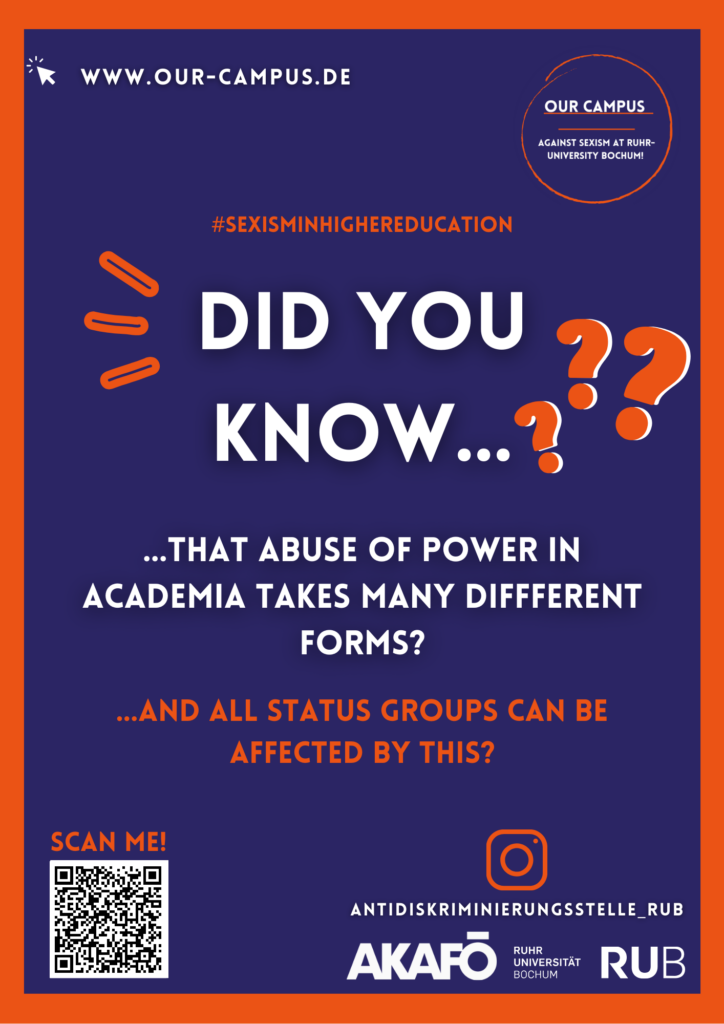
‘Abuse of power is the use of power, e.g. by a manager, for one’s own benefit or that of a group to which one belongs, at the expense of others. The more serious the consequences for those affected, the worse the abuse of power. We understand abuse of power in science as the misuse of a relationship of dependency, particularly in a hierarchical structure. Abuse of power has various facets and manifestations, which can range from sexualised discrimination and violence to threats and scientific misconduct. The abuse of power is often mixed with other types of discrimination such as racism, sexism or ableism.’ [1]
(Definition of abuse of power in science at the TU Berlin).
Abuse of power is widespread in educational institutions and academia and has social, societal and political dimensions. The reasons for this include the fact that the university or campus is a living space for many different people of different ages, genders, origins and religions, which is characterised by relationships of dependency, e.g. between students and lecturers, power asymmetries and structural and intersectional inequalities (such as sexism, racism, classism, etc.).
In North Rhine-Westphalia, the state parliament decided at the beginning of October 2024 to better protect students from abuse of power by revising the Higher Education Act, as universities have so far lacked the legal means to take appropriate action against abuse of power. [2] RUB already has a number of measures in place to combat abuse of power, such as the creation of the anti-discrimination guideline, contact points and contact persons such as the anti-discrimination office, the equal opportunities office and the decentralised equal opportunities and diversity officers. OUR CAMPUS aims to help break the taboos surrounding abuse of power at RUB and counteract it with lectures, workshops and information on social media People who observe abuse of power often do not know how to react or help those affected and it takes a lot of courage to report or address the situation. That is why one of our goals is to raise awareness of counselling centres and other actors on the subject of abuse of power so that those affected and bystanders know who to turn to in an emergency.
Are you affected by abuse of power? You can find help and counselling here:
- The Anti-Discrimination Agency
- What advice is available?
- The RUB Anti-Discrimination Office is the central advice, mediation and information centre for students, employees and other members of the university who experience or observe discrimination and have questions or need support on the subject.
- In which languages do you offer counselling?
- German and English
- Making an appointment
- From 2024 there will be regular consultation hours. These take place every Wednesday from 10:00 to 12:00.
- Please register in advance at: antidiskriminierung@rub.de
- Website
- Please contact
- The central equal opportunities office
- What advice is available?
- The Equal Opportunities Office and the Central Equal Opportunities Officer are the points of contact at RUB for all issues relating to equality and equal opportunities. The Equal Opportunities Office is also the point of contact for advice on experiences of discrimination based on sexual identity and gender.
- In which languages do you offer counselling?
- German & English
- Making an appointment
- Individual appointments can be made by email. Further information here. Consultation via Zoom is also possible!
- Visit our website
- Contact us
- The decentralised diversity and equal opportunities officers
- In addition to the central Equal Opportunities Officers (see below), each faculty also has a team of decentralised Equal Opportunities Officers for all status groups. An overview and further information can be found here. Almost all faculties now also have diversity officers who offer counselling in cases of discrimination regardless of gender. You can find an overview of the decentralised diversity officers here.
Network against abuse of power in science
The aim of the network is to raise awareness of the issue of ‘abuse of power in academia’ and to offer those affected advice independent of organisations. It also sees itself as a point of contact for ombudspersons who are confronted with cases of abuse of power and for institutions that want to prevent abuse of power. You can find more information here.

